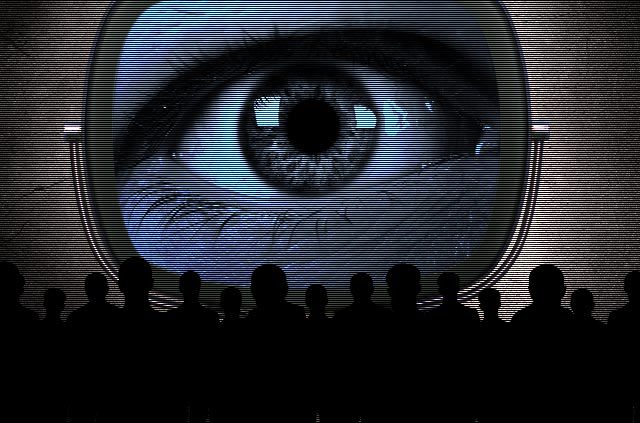Are we living in an Orwellian nightmare? Did 1984 predict real world surveillance?


George Orwell's 1984 is a fictionalized version of a then future-world where a totalitarian state scrutinizes all human actions through the ever-watching Big Brother. The book's focus is Winston, a state worker who struggles to live in such an oppressive world.
The most defining characteristic of 1984 is the brutal extent of Big Brother's surveillance state.
“As for sending a letter through the mails, it was out of the question. By a routine that was not even secret, all letters were opened in transit.”
George Orwell (1984)
It sounds dreadful. But wait, here's what Snowden had to say about the real world:
“The NSA, specifically, targets the communications of everyone. It ingests them by default.”
Edward Snowden
Much like in 1984, we live in a world where it's probably safest to assume everything is recorded, all the time. The National Security Agency (NSA) openly maintains a call database (MARINA) and engages in data-mining (PRISM), without fear of reprisal.
Unfortunately, citizens of the real world are subject to many of the same intrusions as those in Oceania, the fictional state in 1984. Draconian spy programs, like the Investigatory Powers Bill, the NSA’s internet monitoring, and warrantless wiretapping controversies, would definitely blend seamlessly into Orwell’s masterpiece.
Maybe 1984 is closer to home than we think.
Snowden could work at the Ministry of Truth
It is well-known the National Security Agency monitors our Facebook pages and Google searches. And it seems that every store we visit, or website we view, wants a phone number, email address, and postal code to complete a transaction.
Websites like Facebook record all the things we like or dislike, and governments are always looking for ways to hack into our computers and phones to see what we know. The FBI even took Apple to court in an attempt to get permanent access to all iPhone user data.
Then there are surveillance and CCTV cameras littered around the world. It doesn’t matter if we do nothing wrong, our every movement is tracked and recorded.
When Edward Snowden revealed the extent of NSA spying, we probably shouldn’t have been surprised.
We’re very much in a world where Big Brother is watching us all. And Snowden himself bears more than a passing resemblance to Winston, 1984’s narrator and protagonist, who works as a drone for the Ministry of Truth—an organization built to spread propaganda and public falsehoods—which could easily share a manifesto with the NSA:
“Even if you’re not doing anything wrong, you are being watched and recorded.”
Winston or Snowden?
Are we living in a 1984 nightmare?
No, our world is probably worse.
A key feature of Orwell’s novel are the Telescreens that display constant streams of government propaganda (fake news, if you will) and record everything around them. Telescreens aren't quite as mobile, but the similarities between them and cell phones seem horribly apparent.
The technology of our world, with endless possibilities of surveillance, data collection, and storage, surpasses anything Orwell imagined.
The police snoop into our lives at will, and the whims of a higher power with incredible influence permeate everything. Totalitarian figureheads stare from every device around the world, and communication providers broadcast troubling state truths interspersed with a constant stream of dreary infotainment.
But is the above a description of 1984, or modern life?
It seems we are very much in the throes of an Orwellian nightmare, and our digital privacy is constantly under attack.
But you can take steps to protect yourself.
FAQ: About 1984
What is the main plot of ‘1984’?
Winston is a low-ranking member of the party who dislikes the omnipresent surveillance conducted by the party and secretly wishes to rebel. He records his secret thoughts in a diary, an act that is known as a thoughtcrime in the world of 1984.
As Winston’s disillusionment with the party increases, he suspects that a powerful party member, O’Brien, is secretly a member of the Brotherhood, a mysterious group that’s looking to overthrow the regime.
Is Orwell's ‘1984’ a true story?
Why is it called ‘1984’?
Opinion is divided as to why Orwell settled on the title 1984. Orwell’s American publisher claims the title comes from the simple reversal of 1948, the year Orwell finished the book. This claim is unsubstantiated.
Why is ‘1984’ famous?
1984 is also famous for the significant effect it has had on culture and language. Many of the terms coined or popularized by Orwell in 1984 have become part of the English language, such as thoughtcrime, Big Brother (is watching you), newspeak, and doublethink.
Take the first step to protect yourself online. Try ExpressVPN risk-free.
Get ExpressVPN




Comments
The Democrat Party in the us has become the party with propaganda wing, brown shirts, thought police . Their evil must be stoped but like 1984 , the indocrination has left most brain dead
1984 have us the gist of the future but the reality is much much worse.